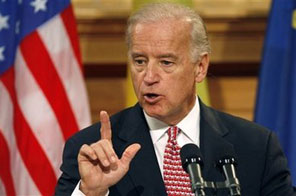Czechs, NATO back US missile plan
PRAGUE: The Czech Republic and NATO said Friday that they backed a reworked U.S. missile defense plan meant to defend against threats from Iran and other nations.
The endorsements came as U.S. Vice President Joe Biden wrapped up a tour of Central Europe aimed at shoring up support for the new system, which is focused on short- and medium-range interceptors.
The Czech republic is "ready to participate in the building of such a new architecture," Czech Prime Minister Jan Fischer told reporters after a meeting with Biden in Prague.
The United States was "very appreciative of the prime minister's statement today," Biden responded, adding that Washington would send a high-level defense team to Prague next month to "discuss the terms this participation will take."
In neighboring Slovakia, NATO Secretary-General Anders Fogh Rasmussen said the system envisioned by the Obama administration would provide Europeans and Americans with protection against a "real threat."
Speaking to reporters in Bratislava after U.S. Secretary Robert Gates briefed NATO defense ministers there, Fogh Rasmussen added that NATO will work with the U.S. to incorporate the system fully into the alliance.
"Ministers welcomed the fact the new approach puts European missile defense more into a NATO context," he said, adding: "It is good for solidarity."
Biden's visit to Central Europe — he was in Poland and Romania earlier this week — comes a month after the Obama administration scrapped Bush-era blueprints to base a missile defense shield in Eastern Europe designed to shoot down long-range missiles. Russia had strongly objected that the system jeopardized its own security.
The decision sparked fears in formerly communist Eastern Europe that Washington was sacrificing its interests in order to improve ties with Russia.
On Wednesday, Poland eagerly signed on to the revamped U.S. missile shield.
But in the Czech Republic, biting comments from former but still influential political figures had tainted the atmosphere ahead of Biden's arrival.
Biden "should clearly explain the reasons that led the Obama administration to its decision not to build a radar in the Czech Republic," Former Prime Minister Mirek Topolanek said in a statement.
Topolanek, whose government signed treaties with the Bush administration to build the radar system and took a lot of heat from a majority of Czechs who opposed the plan, said the Obama administration's moves toward Russia raise questions about "whether the United States is stepping back from the region of Central and Eastern Europe in exchange for better relations with Russia."
Former Czech President Vaclav Havel told the U.S.-funded Radio Free Europe/Radio Liberty that he expected Biden to "make it clear that America is interested in us, that someone else has not pushed us out of America's field of vision."
Analysts had predicted it was unlikely Biden would leave with a clear commitment from Prague, since the country's weak caretaker government lacks a mandate to move forward on any strategic defense issues, including missile defense deals. A new government will be formed only after general elections in May.
The country has been in political limbo since Topolanek's government lost a parliamentary no-confidence vote in March, just before President Barack Obama visited Prague.
"This government could hardly negotiate anything concrete," said Pavel Prikryl, an analyst at Prague's Association for International Affairs.






